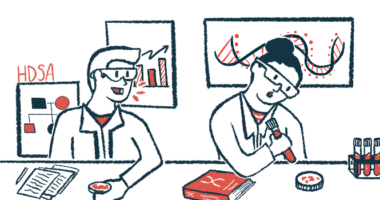How the symptoms of Huntington’s are hindering a brilliant storyteller
The disease leads to cognitive decline, affecting memory and learning

I love stories. It’s why I have a passion for reading. I enjoy being transported to another world by the creative ways writers string words together.
One of the many reasons I love my wife, Jill, is because she’s an incredible storyteller. She could make walking up the stairs an enthralling and detailed mini-drama.
One ingredient that makes her a good storyteller is that she has a deep well of amazing stories to tap into. Some people have a life. Jill has lived hers. There’s a difference.
Another gift is her ability to recall actions and words exactly as they occurred or were spoken.
Sadly, because Jill is gene-positive for Huntington’s disease, her zest for life and her memory will diminish as the rare disease progresses.
When I first told her I loved how funny and dramatic her stories are and that I had never met anyone like her, she laughed.
“Wait until you meet the rest of my family,” she said. “You will find out I am an amateur.”
Once again, she was right. Her family on both sides has the ability to take experiences and spin them into the most exciting things that have ever happened.
As someone with attention-deficit/hyperactivity disorder, I don’t excel at staying focused. But when anyone in Jill’s family speaks, I remember every vivid detail of what they shared.
As I got to know Jill, I noticed something different about the stories she shared with me and others. Every detail was exactly how an event happened. If she was relaying a conversation, she could share every word that was spoken, verbatim. She could even reenact the inflection and tone the person used. I asked her how she was able to do that.
“I can recreate things in my head,” she said. “I picture the room, I picture the people, and then I can remember how things happened and what they said. I could tell you what was in that room, what people were wearing, and what facial expressions they exhibited.”
That all made sense.
“That is so cool,” I said.
Jill agreed and responded with some sage advice: “I will always be able to recall what you said and how you said it,” she said. “So, basically, I will always be right.”
Needless to say, she has always been right since the day I met her.
But lately, I’ve noticed that Huntington’s has started to cause her cognitive decline, one of the disease’s symptoms. It manifests as difficulties with memory and learning. It has started to affect what she hears, the way she hears it, the way she remembers things, and how she shares those things.
As time passes, I see Jill’s memory getting worse, which is adversely affecting the way she tells stories. Her attention to details is not the same as it used to be. Her recall of conversations is not as sharp. As much as I love to win an argument every once in a while, I would rather lose them all, because Jill is always right.
Note: Huntington’s Disease News is strictly a news and information website about the disease. It does not provide medical advice, diagnosis, or treatment. This content is not intended to be a substitute for professional medical advice, diagnosis, or treatment. Always seek the advice of your physician or other qualified health provider with any questions you may have regarding a medical condition. Never disregard professional medical advice or delay in seeking it because of something you have read on this website. The opinions expressed in this column are not those of Huntington’s Disease News or its parent company, Bionews, and are intended to spark discussion about issues pertaining to Huntington’s disease.








Leave a comment
Fill in the required fields to post. Your email address will not be published.